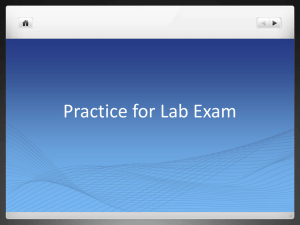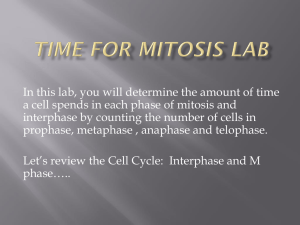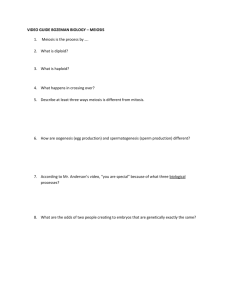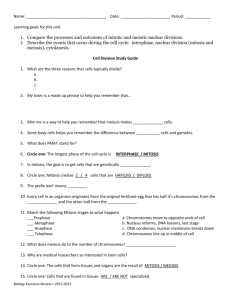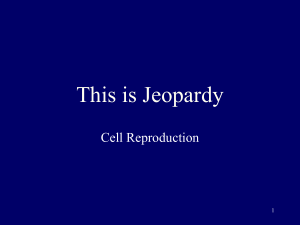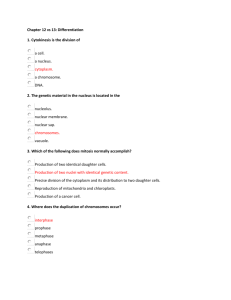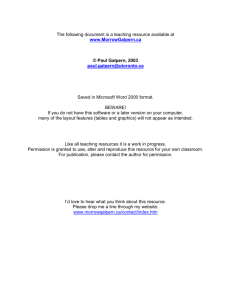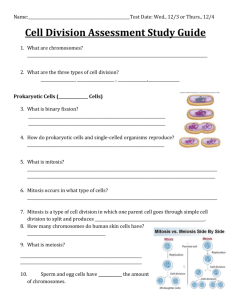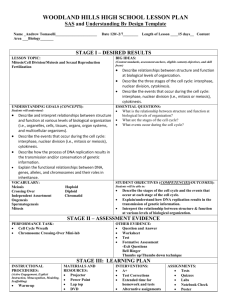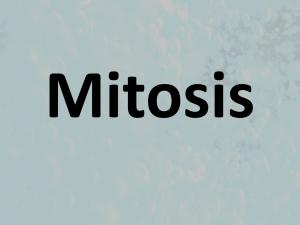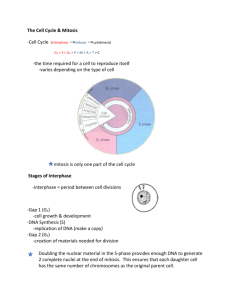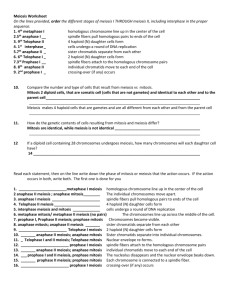File
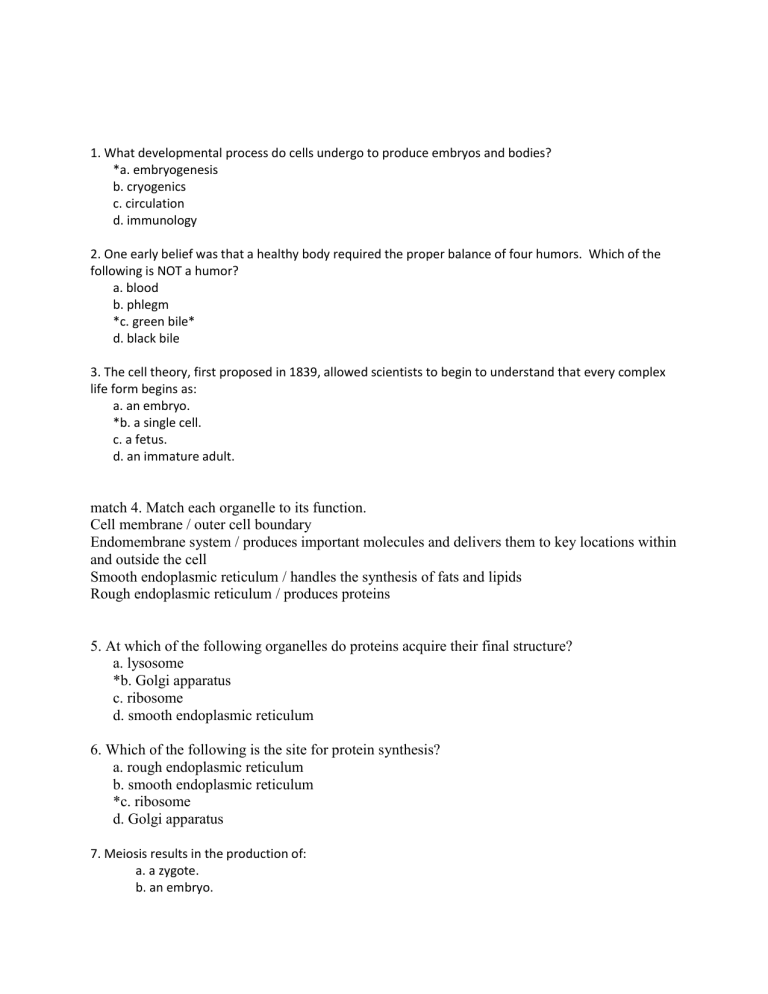
1. What developmental process do cells undergo to produce embryos and bodies?
*a. embryogenesis b. cryogenics c. circulation d. immunology
2. One early belief was that a healthy body required the proper balance of four humors. Which of the following is NOT a humor? a. blood b. phlegm
*c. green bile* d. black bile
3. The cell theory, first proposed in 1839, allowed scientists to begin to understand that every complex life form begins as: a. an embryo.
*b. a single cell. c. a fetus. d. an immature adult. match 4. Match each organelle to its function.
Cell membrane / outer cell boundary
Endomembrane system / produces important molecules and delivers them to key locations within and outside the cell
Smooth endoplasmic reticulum / handles the synthesis of fats and lipids
Rough endoplasmic reticulum / produces proteins
5. At which of the following organelles do proteins acquire their final structure? a. lysosome
*b. Golgi apparatus c. ribosome d. smooth endoplasmic reticulum
6. Which of the following is the site for protein synthesis? a. rough endoplasmic reticulum b. smooth endoplasmic reticulum
*c. ribosome d. Golgi apparatus
7. Meiosis results in the production of: a. a zygote. b. an embryo.
c. a fetus.
*d. sex cells.
8.
Chromosomes line up in single file in the middle of the cell in which phase of meiosis II? a. Prophase II
*b. Metaphase II c. Anaphase II d. Telophase II
9.
In which phase are cells hard at work preparing materials that will be necessary for meiosis to begin? a. morphing phase b. working phase
*c. interphase d. duplicating phase
10.
How can you most easily differentiate between prophase and metaphase during mitosis?
Choose all that apply. a. by looking at the number of chromosomes
*b. by looking at the arrangement of the chromosomes in the cells
*c. by comparing the length of chromatids d. by comparing the color of the chromatids
11. During _____, the sperm cell fuses with the egg cell to form a one-celled embryo.
*a. fertilization b. meiosis c. mitosis d. gastrulation
12. After fertilization occurs, identical copies of the first cell are produced during _______ , which produces _____ cells. a. meiosis; haploid b. meiosis; diploid c. mitosis; haploid
*d. mitosis; diploid
Use the image below to answer Questions 13 and 14.
Img= bozzone_quiz_images/femaleorgans.jpg
13. Fertilization occurred at which of the following locations in the image? a. A
*b. B c. C d. D
14. Where is the zygote implanted in the uterine wall?
*a. A b. B c. C d. D
15. How does a cell’s nucleus play a role in embryonic development? a. It creates the energy associated with cell division.
*b. It provides the genetic material to direct differentiation into the appropriate cell types. c. It synthesizes the fats and lipids needed during cell production. d. It makes the proteins needed to make muscle, hair, enzymes, and antibodies.
16. During interphase of mitosis, cells increase in size.
True
16. During gastrulation in humans and other vertebrates, how do the brain and spinal cord start their development? a. as a hollow ball of cells
*b. as a flat sheet of cells c. as a dense ball of cells d. as an undefined mass of cells
17. During which phase of mitosis do the two daughter cells become physically separated from one another? a. prophase b. anaphase c. metaphase
*d. cytokinesis
18. During which phase of mitosis is a full complement of the genetic instructions found at both poles of a single cell? a. prophase
*b. anaphase c. metaphase d. cytokinesis
19. In which phase of mitosis does a cell selectively activate or deactivate specific genes that lead to specialization?
*a. interphase b. prophase c. metaphase d. telophase
20. Which of the following does NOT occur during the first eight weeks of pregnancy?
a. the development of an embryo
*b. the development of a fetus c. the development of limb buds d. the early stages of the development of fingers and toes
21. During which months does initial fetal development occur? a. 1 - 2 b. 2 - 3
*c. 3 - 4 d. 5 - 6
22.
Which of the following is characteristic of the second stage of labor? Choose all that apply.
*a. Strong contractions occur.
*b. The mother experiences an almost irresistible urge to push. c. The amnion breaks releasing amniotic fluid. d. The placenta is delivered.
23. During the third stage of labor, the:
*a. placenta is delivered. b. baby is born. c. cervix completely dilates. d. first strong contractions occur.
24. Identical twins come from a single fertilized egg that splits into two embryos early in development.
True
24.
Studying both conjoining and normal development has provided scientists with the opportunity to learn about the importance of which of the following for embryonic development:
Choose all that apply.
*a. cell interactions
*b. molecular signals c. cultural influence
*d. gene expression
25.
Conjoined twins cannot form unless the developing embryos share the same: a. chorion b. umbilical cord
*c. amnion d. placenta
